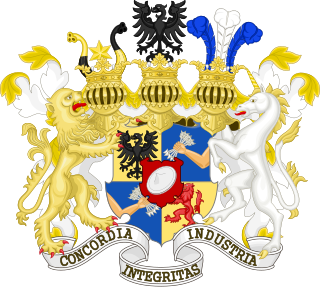Related Research Articles

The Rothschild family is a wealthy Ashkenazi Jewish noble banking family originally from Frankfurt that rose to prominence with Mayer Amschel Rothschild (1744–1812), a court factor to the German Landgraves of Hesse-Kassel in the Free City of Frankfurt, Holy Roman Empire, who established his banking business in the 1760s. Unlike most previous court factors, Rothschild managed to bequeath his wealth and established an international banking family through his five sons, who established businesses in London, Paris, Frankfurt, Vienna, and Naples. The family was elevated to noble rank in the Holy Roman Empire and the United Kingdom. The family's documented history starts in 16th century Frankfurt; its name is derived from the family house, Rothschild, built by Isaak Elchanan Bacharach in Frankfurt in 1567.

Banking in Switzerland dates to the early 18th century through Switzerland's merchant trade and has, over the centuries, grown into a complex, regulated, and international industry. Banking is seen as emblematic of Switzerland. The country has a long history of banking secrecy and client confidentiality reaching back to the early 1700s. Starting as a way to protect wealthy European banking interests, Swiss banking secrecy was codified in 1934 with the passage of a landmark federal law, the Federal Act on Banks and Savings Banks. These laws, which were used to protect assets of persons being persecuted by Nazi authorities, have also been used by people and institutions seeking to illegally evade taxes, hide assets, or generally commit financial crime.

Jacques Laffitte was a leading French banker, governor of the Bank of France (1814–1820) and liberal member of the Chamber of Deputies during the Bourbon Restoration and July Monarchy. He was an important figure in the development of new banking techniques during the early stages of industrialization in France. In politics, he played a decisive role during the Revolution of 1830 that brought Louis-Philippe, the duc d'Orléans, to the throne, replacing the unpopular Bourbon king Charles X. Laffitte was named president of the new Citizen King's Council of Ministers and Minister of Finances. After a brief ministry of 131 days, his "Party of Movement" gave way before the "Party of Order" led by the banker Casimir-Pierre Périer. Laffitte left office discredited politically and financially ruined. He rebounded financially in 1836 with his creation of the Caisse Générale du Commerce et de l'Industrie, a forerunner of French investment banks of the second half of the 19th century such as the Crédit Mobilier (1852). The Caisse Générale did not survive the financial crisis caused by the Revolution of 1848.

Lazard Inc. is a financial advisory and asset management firm that engages in investment banking, asset management and other financial services, primarily with institutional clients. It is the world's largest independent investment bank, with principal executive offices in New York City, Paris and London.
Édouard Stern was a French banker who was infamously murdered in Geneva, Switzerland, by a woman he had a four-year relationship with. At the time of his death, he was the 38th richest French citizen.

The Rothschild banking family of France is a French banking dynasty founded in 1812 in Paris by James Mayer de Rothschild (1792–1868). James was sent there from his home in Frankfurt, Germany, by his father, Mayer Amschel Rothschild (1744–1812). Wanting his sons to succeed on their own and to expand the family business across Europe, Mayer Amschel Rothschild had his eldest son remain in Frankfurt, while his four other sons were sent to different European cities to establish a financial institution to invest in business and provide banking services. Endogamy within the family was an essential part of the Rothschild strategy in order to ensure control of their wealth remained in family hands.

Baron David René James de Rothschild is a French banker and a member of the French branch of the Rothschild family. Since 2018, he is supervisory board chairman of Rothschild & Co and chairman of Rothschild Continuation Holdings, a Swiss holding company.
The Banque de Paris et des Pays-Bas, generally referred to from 1982 as Paribas, was a French investment bank based in Paris. In May 2000, it merged with the Banque Nationale de Paris to form BNP Paribas.

Hottinger Group is an international wealth management business headquartered in London providing family office, Investment banking and other associated financial services. Hottinger is known as one of the first private banks, created on 1 August 1786 by the Hottinguer family.

Banque Bonhôte & Cie is a Swiss private bank founded in 1815 in Neuchâtel. It is active in the wealth and asset management sector.
The Edmond de Rothschild Group is a financial institution specialized in private banking and asset management. Based in Geneva, the group is family-owned and independent, and encompasses the Edmond de Rothschild Foundations, the lifestyle brand Edmond de Rothschild Heritage, and sponsors the Gitana Team.

UBS Group AG is a multinational investment bank and financial services company founded and based in Switzerland. Headquartered in Zürich, it maintains a presence in all major financial centres as the largest Swiss banking institution and the largest private bank in the world. UBS client services are known for their strict bank–client confidentiality and culture of banking secrecy. Because of the bank's large positions in the Americas, EMEA, and Asia Pacific markets, the Financial Stability Board considers it a global systemically important bank.

The Crédit Mobilier was a French banking company created in 1852 by the Pereire brothers, and one of the world’s most significant and influential financial institutions in the mid-19th century.

The Swiss investment bank and financial services company, UBS Group AG, has been at the center of numerous tax evasion and avoidance investigations undertaken by U.S., French, German, Israeli, and Belgian tax authorities as a consequence of their strict banking secrecy practices.
Rothschild & Co is a multinational private and merchant bank, headquartered in Paris, France. It is the flagship of the Rothschild banking group controlled by the British and French branches of the Rothschild family.
An independent advisory firm is an investment bank that provides strategic and financial advice to clients primarily including corporations, financial sponsors, and governments. Revenues are typically generated by providing deal-specific advice related to mergers and acquisitions and financing. The WSJ noted in January 2016 that "boutique is a fuzzy label, defined as much by what these firms do as what they don’t do ."

PJT Partners, Inc. is a global advisory-focused investment bank, founded in October 2015 as part of The Blackstone Group's spin-off of its financial and strategic advisory services businesses. The firm was founded by Paul J Taubman after his 30-year tenure at Morgan Stanley, where he served as Global Head of Mergers and Acquisitions, Global Head of Investment Banking and until the end of 2012, Co-President of the Institutional Securities Group, which included Investment Banking as well as Sales and Trading.
The Stern family is a Jewish French banking family originally from Frankfurt. It traces back to Samuel Hayum Stern (1760–1819), who in the 1780s became a wine merchant in Frankfurt.

Andrea Orcel is CEO of UniCredit. He previously served as the president of UBS Investment Bank from November 2014 to September 2018. He was poised to take on the role of Chief Executive of Banco Santander from September 2018 to January 2019; however, the job offer was later withdrawn which resulted in him taking legal action against Santander. In December 2021 a judge awarded him €68m in compensation, including €10m for moral damages. Since early 2020, Orcel has been linked to taking over as CEO at a variety of financial institutions including starting his own boutique investment bank, before taking the role of Group CEO at UniCredit.

The Banque Rothschild, formally known as de Rothschild Frères until 1967, was the family-controlled bank of the Rothschild banking family of France. It was established in 1817, expropriated by Vichy France in 1940, returned to the Rothschilds after the liberation of France in 1944, and nationalized in 1982 after which it operated under the name of its subsidiary Compagnie Européenne de Banque and was eventually sold in 1991 to Barclays. It played a major role in French financial development in the 19th century, and remained significant for much of the 20th century.
References
- ↑ "Edouard Stern,Ex-Lazard Banker, Dies in Geneva at 50 (Correct) - Bloomberg". www.bloomberg.com. Retrieved 2015-12-18.
- 1 2 Carreyrou, John; Wrighton, Jo; Galloni, Alessandra. "How Banker's Life, Full of Intrigue,Ended in Murder". Wall Street Journal. ISSN 0099-9660 . Retrieved 2015-12-18.
- ↑ "L'affaire Stern : épilogue d'un itinéraire tourmenté". Les Echos. June 8, 2006. Retrieved December 18, 2015.